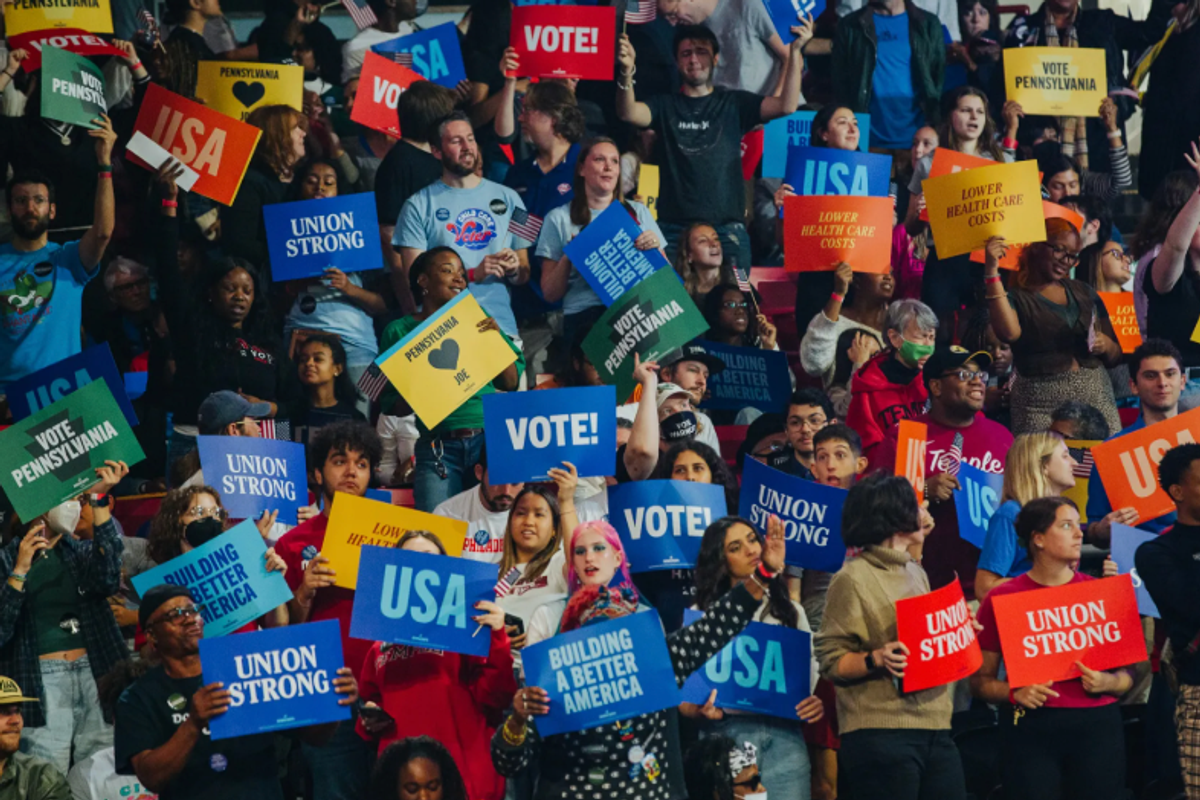If Voters Blame Republicans For Shutdown, Why Are They Angry At Democrats?

With the government shut down, polls show Americans are angrier at Republicans than Democrats. That’s good news for Democrats, right?
It’s complicated. Yes, voters are upset with President Donald Trump and the GOP—largely because they’ve flatly refused to even negotiate on health care protections for millions—but Democrats aren’t getting a free pass. Despite their efforts to cut a deal, many of their own voters remain frustrated and give their leaders low marks.
“Republicans have historically been more loyal. That has wavered in a couple of elections, but it’s been generally true,” Grant Reeher, a professor of political science at Syracuse University, told Daily Kos. “The other advantage is that the Republicans currently have a president in office, and presidents have often fared better than Congress. So, in part, it’s a ‘president effect.’”
Still, you’d think Democrats would get more credit—especially now. In the days leading up to the shutdown, the party pushed for stronger health care protections. Their proposal would roll back the Medicaid cuts in Trump’s tax and immigration law, and it would extend enhanced Affordable Care Act subsidies, which are set to expire at the end of this year. At a moment when polls show Democratic voters want their leaders to fight harder, this was Democrats putting up a fight.
But so far, that fight isn’t resonating.
“When a party loses an election, they become less popular, including with their own supporters,” said David Hopkins, a political scientist at Boston College. “Their own supporters get very upset and say the party ‘blew it.’ Their voters are in a bad mood and want someone to blame, so they’ll blame the leadership of their own party for squandering the election and causing all these bad things to happen now that the other side is in power.”
Polling data backs that up. Since the last election, views of congressional Republicans have remained fairly stable, but Democrats in Congress are viewed far more negatively in comparison, according to YouGov’s tracking data.
That’s the paradox: Democratic voters demand tougher resistance to Trump, but they’re sour on their party even when it does exactly that.
The numbers are rough. A new NPR/PBS News/Marist poll shows just 26 percent of voters approve of how congressional Democrats are doing in office. And a whopping 64 percent of voters disapprove, up from 58 percent in July—and 42 percent of Democrats disapprove. Republicans in Congress do only slightly better, with 37 percent approval and 56 percent disapproval among voters.
In other words, Democrats trail Republicans by 11 percentage points on approval, even though voters overwhelmingly blame the GOP for the shutdown. That contradiction speaks volumes.

“It’s one thing to say you think Sen. [Chuck] Schumer is less to blame than President Trump, and quite another to say you support the job that Sen. Schumer is doing,” Reeher said. “The dissatisfaction among Democrats has been festering for a long time—at least back to the first Trump presidency. Many were deeply dissatisfied with [Joe] Biden as the nominee in 2020, and with the way the latter half of his term was managed, especially the campaign disaster. One small tilt favoring the Democrats on a government shutdown is not going to erase all that damage.”
“The Republicans have been more loyal and are more focused on the president—that’s what these overall numbers are reflecting,” he added.
Shutdown politics rarely deliver big policy wins. From December 2018 to January 2019, Trump shut down the government, demanding billions of dollars to build a wall along the U.S.--Mexico Border—and got nothing. In 2013, Republicans wanted to defund the ACA, kicking off a 16-day shutdown that produced little tangible results for them. At best, shutdowns offer largely symbolic wins for a party’s base. At worst, they backfire.
“I’m a skeptic about shutdown politics, but I understand the choices of the Senate Democrats because what we’re seeing in the polls is what they’re hearing,” Hopkins said. “They feel pressure to have some dramatic moment, so that’s where we are. If history is any guide, we will not end up with a real victory they can tout to their supporters.”
Maybe the problem is that voters tend not to reward effort. Resistance without real wins fades fast, and even actual achievements barely register with an exhausted public. Or maybe it’s that many Americans don’t realize Democrats can’t fully stop Trump’s agenda when they don’t hold a majority in either chamber of Congress.
The Democratic Party’s approval rating usually gets an approval boost only after it actually wins power. According to Pew’s data, their peak approval in the past decade came in early 2021, right after winning a government trifecta. And a smaller boost happened in early 2019, after they regained control of the House and wielded real power to fight Trump.
Democrats also face a structural challenge Republicans don’t: a lack of a clear leader.
Former President Joe Biden remains unpopular and is largely invisible. Former Vice President Kamala Harris lost last year’s election and didn’t connect deeply with many voters. Former President Barack Obama is nearly a decade removed from office. And while former House Speaker Nancy Pelosi once embodied the anti-Trump resistance, her successors—House Minority Leader Hakeem Jeffries and Senate Minority Leader Chuck Schumer—are hardly household names, according to Pew.
Republicans, meanwhile, still have Trump. After his 2020 loss, GOP voters didn’t splinter the way Democrats have. Some denied he lost, and even those who didn’t deny the election results still rallied around him. No alternative figure emerged to take his place.
The good news for Democrats is that these feelings aren’t permanent. As Hopkins put it, politics is as much about emotion as logic, and Democratic voters are still angry and scared. The surest way to channel that energy outward instead of inward? Start winning again.
“It seems like the next election is a million miles away, but in reality, we have more elections than any other country and there’s one right around the corner next year,” Hopkins said. “If what you really want to do is constrain Trump’s freedom of movement to implement policies, the best way to do that is to put one house of Congress in the hands of the Democrats in 2026.”
Reprinted with permission from Daily Kos
- Countdown To Shutdown - National Memo ›
- Did America's Enemies Write Trump's Backward Energy Policy? ›
- Newsom Trolls Trump (And Red States) With True Crime Statistics ›
- The Issue That Won Trump Another Term Is Now His Worst Nightmare - National Memo ›
- 'On Vacation': Jeffries Scorches GOP Leaders For Fleeing Town During Shutdown - National Memo ›
- New Poll: Public Anger At Republicans Deepens As Shutdown Drags On - National Memo ›
- Trump Van Winkle, Obamacare And The 'Money-Sucking' Health Insurance Industry - National Memo ›
- Despite Frustrating End, Democrats Can Still Build A Victory From 40-Day Shutdown - National Memo ›
- I Was Wrong: Democrats Won A Dunkirk Victory In Shutdown Defeat - National Memo ›
- Are Americans Comfortable With The Unimaginable -- Or Have We Reached Our Limit? - National Memo ›
- Trump and GOP face more shutdown blame, but Americans remain ... ›
- Mass email tells federal employees not to blame Trump for ... ›
- Trump admin uses government sites to blame Democrats for shutdown ›
- How to Win the Shutdown Blame Game, According to Those Who've ... ›
- Federal agencies are told to blame Democrats for a shutdown : NPR ›
- Early polls show Trump, GOP taking more blame than Democrats for ... ›
- Trump wields axe over 'Democrat Agencies' as shutdown blame ... ›








